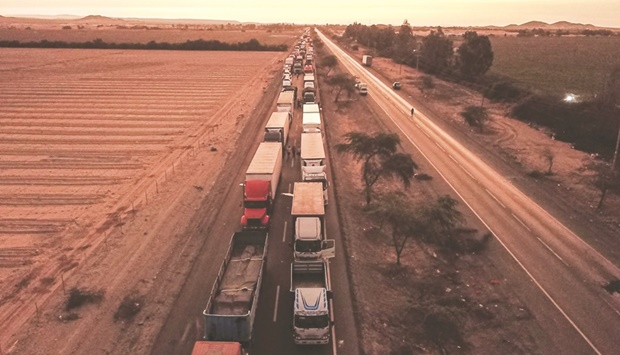Peruvian President Pedro Castillo has announced a curfew in the capital Lima and neighbouring port city Callao, after demonstrations across the country over fuel prices caused roadblocks and “acts of violence”.
Protests had erupted across Peru in recent days due to a hike in fuel prices and tolls, during a time of rising food prices.
In an attempt to appease protesters, the government eliminated the fuel tax over the weekend.
However, truckers and other transport workers took to the streets again on Monday in Lima, as well as several regions in the north – from the coastal city Piura to the densely forested Amazonas, blocking traffic.
Castillo announced late on Monday that Peru’s Council of Ministers had approved a curfew for the following day.
“In view of the acts of violence that some groups have wanted to create ... and in order to reestablish peace ... the Council of Ministers has approved the declaration of citizen immobility (curfew) from 2am to 11.59pm on Tuesday, April 5,” he said in a televised message.
There have been several violent incidents during recent protests, including the burning of toll booths on highways, looting and clashes with police.
Protesters had also set fire to tyres and blocked the Pan-American highway, the country’s most important transport and traffic artery snaking north to south, and school was suspended.
“I call for calm and serenity,” the leftist president said during his brief appearance on television. “Social protest is a constitutional right, but it must be done within the law.”
The 52-year-old former teacher announced the curfew a week after he was saved from being impeached by Congress, where opponents accused his administration of having a “lack of direction” and for allegedly allowing corruption in his entourage.
The impeachment attempt last week was the second during Castillo’s eight-month administration in a country with a recent history of ousting presidents.
Castillo’s action to impose movement restrictions – which will cover more than 10mn residents in Lima and Callao – was met with immediate repudiation.
“A curfew to reestablish order – (this is) an authoritarian measure of Pedro Castillo’s government that shows ineptitude, incapacity to govern,” political analyst Luis Benavente told AFP. “It is like putting an end to traffic accidents by taking vehicles off the roads.”
The curfew measures coincide with the 30th anniversary of a coup staged by former president Alberto Fujimori, a controversial figure now jailed after a regime marked by a bloody campaign against insurgents.
“The measure dictated by President Pedro Castillo is openly unconstitutional, disproportionate and violates people’s right to individual freedom,” tweeted lawyer Carlos Rivera, one of the defenders of the victims of Fujimori’s government.
Like much of the rest of the world, Peru’s economy is still recovering from the damages wrought by the coronavirus pandemic.
The country’s Consumer Price Index in March saw its highest monthly increase in 26 years, driven by soaring food, transport and education prices, according to the national statistics institute.
The multi-region demonstration was largely organised by the Union of Multimodal Transport Guilds of Peru.
To appease them the government eliminated the fuel tax over the weekend, and Castillo decreed a 10% increase in the monthly minimum wage – which would rise to 1,025 soles ($277) beginning in May.
However, the General Confederation of Peruvian Workers, the country’s main trade union confederation, rejected the wage hike, stating that it was insufficient, and called on its affiliates to march tomorrow.
Influential journalist Rosa Maria Palacios said on Twitter that Castillo’s 11th-hour announcement of a curfew only revealed how the government had “lost all control of public order”.
“By denying them the right to work, without any real cause, Castillo has put himself in a situation of absolute vulnerability,” she warned.

Buses are parked along the Pan-American highway during a road blockade as part of a partial strike of cargo and passenger carriers, in Ica, in southern Peru, on Monday. The partial strike of cargo and passenger carriers caused road blockades and suspension of classes in Peru, in the first strike against the government of leftist President Pedro Castillo.
